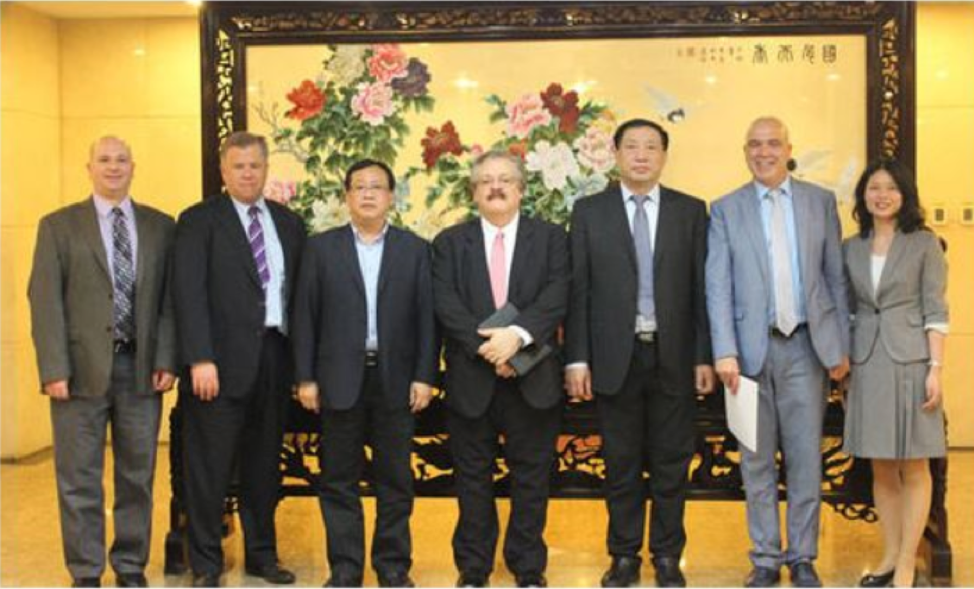“Instead of using antitrust policy to diffuse the huge market power of big tech, the Antitrust Division, captured by big tech interests, is hastily pushing through antitrust policies that augment the already-enormous power of big tech.”

* Apple-consultant Don Wright and Intel employee Phil Wennblom lead a meeting with China’s government to discuss standard essential patents (source: NDRC press release). In 2015, Qualcomm paid China a $975 million fine in a case involving cellular technology.
Historically an esoteric area of law, in recent years, antitrust policy is drawing broader attention as a tool to curb the exercise of monopolistic market power, especially by big tech behemoths. Congressional reports on both Democratic and Republican sides of the aisle, multiple legislative initiatives to reform U.S. antitrust law, and a recent book by Senator Amy Klobuchar (D-MN), Chair of the Senate Judiciary Subcommittee on Competition Policy, Antitrust, and Consumer Rights, are some indicators of this trend. Along these lines, broad outcry broke out against rumored Department of Justice (DOJ) Antitrust Division leadership appointments of candidates representing big tech interests, such as Karen Dunn (Apple, Amazon), Renata Hesse (Google, Amazon), Susan Davies (Facebook), and against Deputy Attorney General Lisa Monaco’s (Apple, Google) involvement in deliberations over the nomination of a DOJ Assistant Attorney General (AAG) for Antitrust.
A parallel bipartisan trend recognizes the key importance of securing Western leadership in cutting edge technologies such as 5G and artificial intelligence (AI) to U.S. interests and national security. Technology is protected by intellectual property (IP) rights. Hence, the March 2021 National Security Commission on Artificial Intelligence (NSCAI) report highlighted the U.S. lack of “comprehensive IP policies to incentivize investments in and protect the creation of [AI] and other emerging technologies.” The report notes China is poised to “fill the void” left by weakened U.S. IP protections, particularly for patents, as the United States has lost its “comparative advantage in securing stable and effective property rights in new technological innovation…. [a] policy asymmetry [that] has multiple significant domestic and international implications for the U.S”.
President Biden fully understands the key importance of technological leadership to U.S. interests. For example, in a speech last month, he noted:
You know, we used to invest more in research and development than any country in the world and China was number eight — or, excuse me, number nine. We now are number eight and China is number one. Can’t let that be sustained. The future is going to be determined by the best minds in the world, by those who break through new barriers.
Connecting the Dots
It is hard to reconcile the above two trends with recent developments at the DOJ Antitrust Division. Let me connect the dots for you:
- Since the 2007 launch of the iPhone, big tech has spent big bucks on fierce lobbying for policies that devalue cutting-edge technologies such as LTE and 5G (these are protected by standard essential patents – or SEPs). Why? Because they would rather get a cheap ride (or, even better, a free ride) while benefiting from valuable technology developed by others. Mighty participants in this well-funded advocacy effort include Apple, Google, Cisco, Intel, Microsoft, Samsung and the numerous trade associations they fund and operate such as the ACT App(le) Association and the Chamber of Progress launched by Google’s “former” chief lobbyist.
- As noted, e.g., in the Mitre Report, China employs multiple support and subsidy mechanism to support Chinese companies’ investment in telecom R&D and development of standards such as 5G. Non-Chinese companies who want to stay in this race do not enjoy such subsidies – many of them rely on SEP licensing to continue the investment cycle. Hence, policies that devalue SEPs directly weaken U.S. leadership in 5G.
- The Antitrust Division does not yet have political leadership in place – an AAG for Antitrust is yet to have been nominated, let alone vetted or confirmed by the Senate under the normal U.S. political process. Nonetheless, the Antitrust Division seems to be moving full steam ahead with proactive policy positions that support big tech financial interests while compromising efforts to maintain non-Chinese leadership in 5G. Such moves will lock in the future Antitrust AAG even before her/his first day on the job.
For example, in mid-April, Acting AAG Powers told journalists the Division is reclassifying its 2020 Business Review Letter to IEEE by moving it to the Comments section of its website (where it cannot be found). The 2020 letter corrected misrepresentations of an earlier DOJ letter that were used by the Chinese government to facilitate theft of U.S. technology. This chain of events raised serious bipartisan concerns by Senators Coons (D-DE) and Tillis (R-NC) as well as by a bipartisan group of former Democratic and Republican DOJ, FTC and USPTO leadership.Then, on June 3, acting AAG Powers was reported as saying the division will “soon” release revisions to policies that intersect competition and IP law, alluding to those involving SEPs. The implications of that comment are probably new policies that devalue SEPs.All of these announcements have appeared out of thin air, without any public debate.
- Who is behind all these policies that compromise U.S. technological leadership interests while the lights at the Antitrust AAG’s office are still off? The answer is clear. While the public outcry against big tech lawyers may prevent them from securing an Antitrust AAG nomination (or not – we’ll see), in the meantime they are hard at work putting irreversible policy stakes in the ground without senate oversight or public debate. Apple lawyer, Karen Dunn, is a close friend of AG Garland (she helped prepare him for his senate confirmation). Google and Amazon lawyer Renata Hesse, who wrote the 2015 IEEE policy statement misused by the Chinese government, is the former boss of rumored-AAG-nominee Jon Sallet. And, long time Antitrust Division Special Counsel for IP, Frances Marshall, joined Apple last year and is now working with her decades-long Division colleagues and friends to promote policy positions that benefit Apple’s bank account.
Instead of using antitrust policy to diffuse the huge market power of big-tech, the Antitrust Division, captured by big tech interests, is hastily pushing through antitrust policies that augment the already-enormous power of big tech.
Big Tech Should Not Be Pulling the Strings
These dynamics are unacceptable. They are detrimental for U.S. interests vis-a-vis China. They mislead voters who relied on election promises to curb the power of big tech, providing U.S. government financial support to companies that are the strongest in the world (and already doing very well for themselves without help from the feds).
Finally, and worst of all, these dynamics are anti-democratic and reminiscent of regimes and administrations the current administration looks down at. Antitrust policy should be created by senate-confirmed Antitrust AAGs, ideally after an open public debate (of the type led by former AAGs of all administrations). The mad rush to put policy stakes in the ground before leadership is in place without an open debate suggests big tech and their lawyers know well that what they are doing is wrong. Of all administrations, it is hard to believe the Biden administration is allowing such a settlers’ “Oklahoma Sooners” exercise to take place. Equally surprising and ironic is the sight of an antitrust agency proactively engaging in gun-jumping.

![[IPWatchdog Logo]](https://ipwatchdog.com/wp-content/themes/IPWatchdog%20-%202023/assets/images/temp/logo-small@2x.png)

![[[Advertisement]]](https://ipwatchdog.com/wp-content/uploads/2023/01/2021-Patent-Practice-on-Demand-1.png)
![[Advertisement]](https://ipwatchdog.com/wp-content/uploads/2024/04/Patent-Litigation-Masters-2024-sidebar-700x500-1.jpg)

![[Advertisement]](https://ipwatchdog.com/wp-content/uploads/2021/12/WEBINAR-336-x-280-px.png)
![[Advertisement]](https://ipwatchdog.com/wp-content/uploads/2021/12/2021-Patent-Practice-on-Demand-recorded-Feb-2021-336-x-280.jpg)
![[Advertisement]](https://ipwatchdog.com/wp-content/uploads/2021/12/Ad-4-The-Invent-Patent-System™.png)






Join the Discussion
6 comments so far.
Anon
June 15, 2021 06:49 pmStroud making noises about “double think” seems to be itself “double think.”
David Cohen
June 15, 2021 03:18 pmHi Jonathan! Sorry, perhaps you misunderstood my piece. I did not express a problem with any name (simply described what I read in the press), and am not sure what former AAG for Antitrust you had in mind. Assuming it was the most recent one, below are some of the many differences:
1) At the beginning of the Trump administration, the DOJ Antitrust Division went over 9 months without a confirmed AAG. During that time, career DAAG Brent Snyder (Jan-Apr 2017) and political Principal DAAG Andrew Finch (Apr – Sept 2017) served as *Acting* AAGs just like career DAAG Richard Powers is now Acting AAG.
Acting AAGs Snyder and Finch, like their predecessors in many prior administrations, refrained from changing any policy positions. Respectful of the our democratic process, they waited for a Senate-confirmed AAG to be in place. It is unclear why the current Acting AAG is circumventing the process and gun-jumping to deviate from this longtime practice.
2) Even after senate-confirmed AAG Delrahim took office in late Sept. 2017, most of his policy positions in this area took place in 2018-2020, after considerable time for a robust debate in this area from all stakeholders. There was no mad rush to put stakes in the ground.
3) I don’t know what innovator “stakeholder” you had in mind, but none of the major innovator position holders in this space are part of the omni powered big-tech group that both Democrats and Republicans agree are compromising U.S. competition and consumer interests. Having the Antitrust Division proactively hand out favors to Big Tech at a time when everyone agrees its omni power is a problem is an oxymoron. It’s called the “anti-trust” division rather than the “pro-trust” division for a reason.
Jonathan Stroud
June 14, 2021 09:53 amMy friend! It is darn near doublethink to suggest, after an *actual lobbyist* for one of the bigger stakeholders on the licensor side was the former DOJ antitrust head, that THIS represents agency capture. I’m no expert in this field. But let’s take your point, for the purposes of argument—If you have a problem with these names, you must have had a huge, huge problem with the last one, right?
Pro Say
June 11, 2021 07:51 pmThanks for the superb analysis of yet another sad state of affairs David.
Why does our Executive Branch, Congress, SCOTUS, and CAFC continue to take actions and render decisions which hurt America and its citizens?
From antitrust to the forced giveaway of vaccine technology . . . from promising to restore patent eligibility to all areas of innovation but then doing nothing . . . from eBay to KSR to Mayo to Alice . . . from garage door openers to car axles to now cameras . . . how long will it be before China becomes the undisputed king of all that matters?
How much longer?
Joe Doe
June 10, 2021 09:14 pmVery thoughtful and spot on. 8 of today’s 10 largest mobile manufacturers are Chinese. These hasty policies by a captainless Antitrust Division ship will facilitate their lucrative infringement of U.S. technology at the expense of US R&D and inspire baseless “investigations” of U.S. companies by China’s “antitrust” agency (SAMR).
I also agree that use of antitrust policy to strengthen the already-formidable market power of big tech is anticompetitive and a terrible use of tax payers money.
Anon
June 10, 2021 07:10 pmInteresting.
One aspect that I would point out: I have LONG stated that an underlying problem (and the one reflected here in just ‘who’ is doing the capturing) is an untoward (and unchecked) power of the juristic person of corporations.
Such — and especially Big Corp — simply are not beholding to any sense of operating in line with the benefits of the Sovereign.
The likes of such cases as Citizen’s United exacerbates the problem of Monied Voi€e$ and regulatory capture.
Combine that “front of attack” with a general (and historical) Supreme Court ‘anti patent as personal property’ proclivity, and we see in patent law (even presaging) a mirror of the larger societal breakdowns in the “marriage” of Big Tech and the Liberal Left.